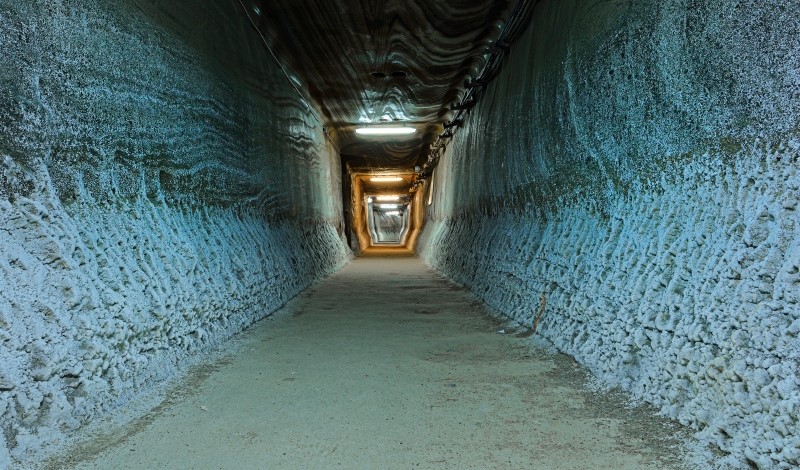
The U.S. government should improve access for noncitizens to evidence in immigration hearings.
For immigrants seeking U.S. citizenship or fighting deportation orders, a network of limestone mines near Kansas City, Missouri, could contain information crucial to their cases.
No formal discovery rights exist in immigration proceedings, and the law does not require government attorneys to disclose evidence relevant to an immigrant’s case. Because of this information asymmetry, immigrants often struggle to defend themselves against deportation charges.
Instead, noncitizens must submit Freedom of Information Act (FOIA) requests to obtain their immigration records from the U.S. government. The FOIA process moves slowly, though, and the U.S. government may deport a noncitizen before the requested documents arrive.
Hundreds of miles from either border, much of the information requested by these immigrants is stored in old limestone mines known as the Cave. The Cave serves as the National Records Center for the U.S. Citizenship and Immigration Services (USCIS), the federal agency that processes and administers immigration benefits such as citizenship and asylum.
Today, the Cave holds over 20 million Alien Files (A-Files), which include government records documenting noncitizens’ interactions with immigration agencies through visas, photographs, birth certificates, affidavits, and internal agency correspondence about their legal status.
Administrative agencies rely on A-Files when adjudicating immigration status, supporting deportation orders, and assessing public benefits eligibility. Immigration scholars note that for some individuals in removal proceedings, their A-Files may contain evidence that verifies their legal status or otherwise supports relief from deportation.
But instead of having discovery rights to these files, noncitizens must rely on FOIA requests to access them.
Last amended in 2016, the FOIA statute created a judicially enforceable right for anyone to request federal government records. The U.S. Congress requires agencies to disclose the information requested unless it implicates certain government interests, such as law enforcement, national security, or trade secrets.
Early proponents of open government laws framed FOIA as promoting egalitarianism and trust. The U.S. government itself celebrates FOIA as a transparency tool that “keeps citizens in the know about their government,” including about the immigration system.
But scholars argue that replacing discovery with FOIA in immigration proceedings does not align with Congress’s intent for FOIA. The original intent was to promote public oversight of government activities, not to secure personal immigration records.
Without evidence disclosure requirements akin to those in criminal proceedings, the U.S. government often violates noncitizens’ due process rights during immigration hearings.
FOIA requests alone cannot remedy this harm.
The FOIA statute requires federal agencies to respond within 20 business days of receiving a records request. Yet in 2020, agencies averaged over three months to process requests. For more “complex” and detailed requests, agencies averaged six months.
Even before the COVID-19 pandemic slowed FOIA response times, agencies sometimes provided documents years after a request—far too late to help an immigrant’s case.
In addition, the fugitive disentitlement doctrine may limit certain immigrants’ FOIA rights. Fugitive disentitlement is a criminal law doctrine that allows a court to dismiss a pending criminal appeal if the defendant escapes custody and becomes a fugitive. Some courts have been found to apply the doctrine to civil immigration appeals as well.
U.S. Immigration and Customs Enforcement, the federal agency that enforces immigration laws, declared in 2017 that it would stop processing FOIA requests for noncitizens it considered “fugitives.” A “fugitive,” according to the agency, includes any noncitizen who commits a crime, fails to leave the United States, or fails to comply with agency reporting requirements.
A federal district court in 2019 deemed this blanket withholding of government records improper. But the court left open the broader question of whether fugitive disentitlement could ever apply to noncitizens’ FOIA cases.
Another obstacle for noncitizens seeking their records is that, even when agencies respond to FOIA requests, they sometimes apply disclosure exemptions and heavily redact records or withhold records entirely.
One version of this withholding is when law enforcement agencies issue Glomar responses. In Glomar responses, agencies neither confirm nor deny the existence of the requested records. They claim that even confirming the existence of the records would harm national security interests or undermine ongoing police investigations.
And because noncitizens are often transferred to federal immigration custody following criminal arrests, a Glomar can undermine noncitizens’ procedural rights during later immigration hearings. In effect, government attorneys can use “secret evidence” against immigrants.
Finally, few immigration lawyers challenge agency withholdings due to time constraints and high litigation costs, compounding immigrants’ disadvantages.
Nevertheless, even though FOIA is a poor substitute for full discovery rights, the law, with a couple of necessary changes, can still benefit immigration proceedings.
First, USCIS’s longtime reliance on paper files exacerbates its FOIA backlog and undermines immigrants’ due process rights. For example, an immigrants’ rights group sued USCIS because the agency failed to retrieve their clients’ requested A-Files—housed in one of the Missouri limestone mines—for over two years.
Accordingly, USCIS should digitize A-Files to improve document retention and retrieval.
Second, in addition to the Cave, the federal government stores immigration records within the U.S. Department of Justice and the U.S. Department of Homeland Security. Determining which agency or limestone cave holds an immigrant’s records complicates FOIA processing.
Thus, USCIS should also centralize recordkeeping and dedicate a budget and staff to FOIA processing. Or, in the alternative, Congress could direct USCIS to remove A-File requests from the FOIA process entirely and create a separate, expedited system for them.
In reality, fixing FOIA to improve immigration proceedings requires more than scanning all the documents in the limestone mines. Barring more significant changes, however, these modifications to agencies’ storage and processing standards can make FOIA more useful to immigrants.



